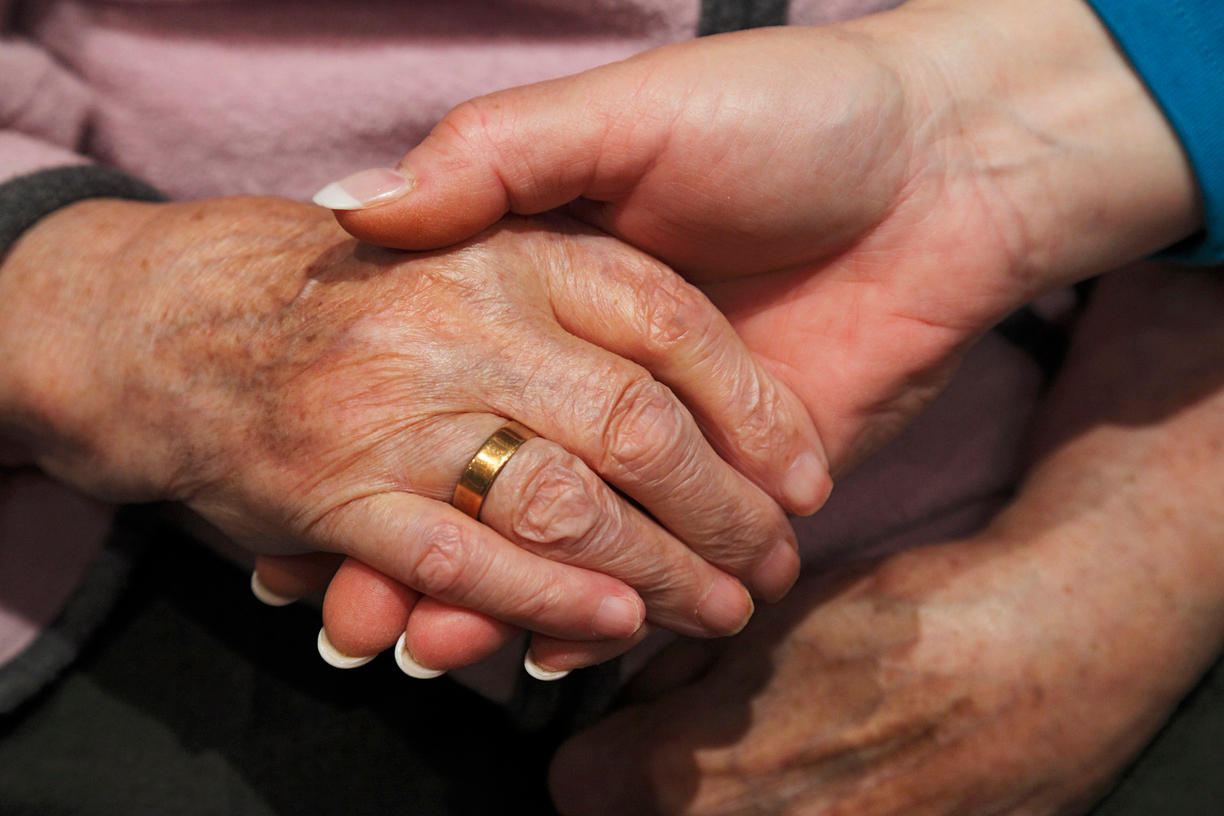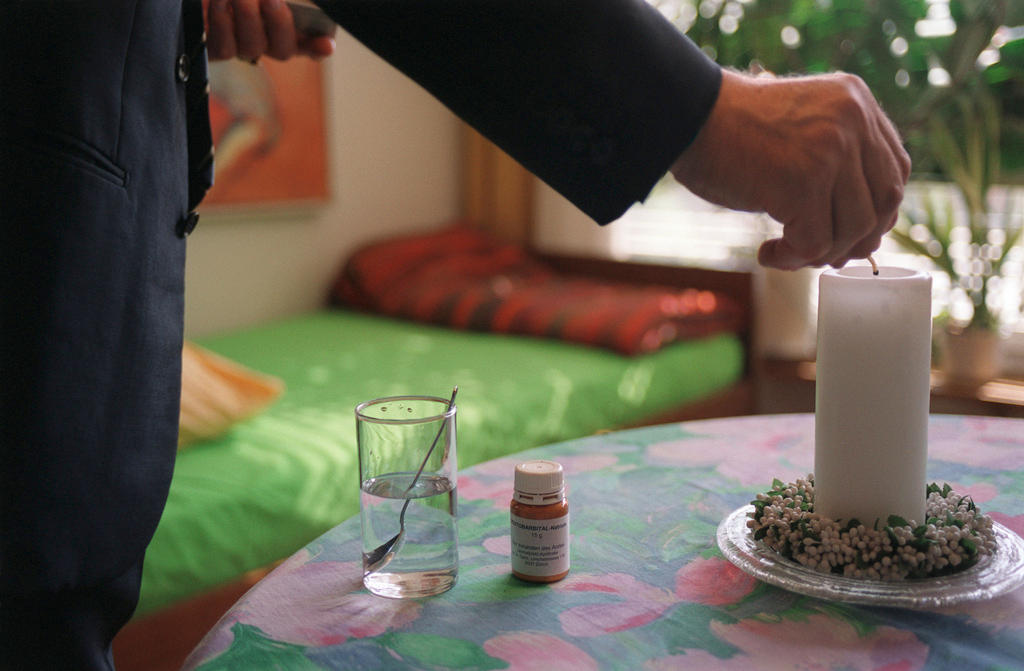The global fight for assisted suicide

Swiss right-to-die organisations are politically and legally active abroad in a drive to legalise assisted suicide worldwide. They believe that political and religious elites do not respect the will of the people.
Assisted suicide is legal under Swiss law, and several organisations offer this service. As one of the few countries in the world with such a law, Switzerland sees many foreigners coming to end their lives from countries where assisted suicide is forbidden.
Some Swiss right-to-die organisations take their commitment a step further, by engaging in efforts to legalise assisted suicide in other countries. Internationally, one of the most active proponents of assisted suicide is the association Dignitas, whose motto is “To live with dignity – To die with dignity”. Dignitas’ self-proclaimed aim is to make itself superfluous: the seriously ill should not have to travel to Switzerland to get the help they seek, but should receive this assistance in their own countries, the organisation argues. Dignitas describes itself as a “fighting organisation”, committed to “universal militancy” until all states recognise the right of their residents to freedom of choice and self-determination at the end of their lives, including the choice of assisted dying.
Dignitas is not fighting this battle on its own. On its website, the similarly-oriented Eternal SPIRIT Foundation writes: “Eternal SPIRIT is committed to promoting the legalisation of assisted suicide in all countries.” And the organisation EXIT ADMD Suisse Romande in French-speaking Switzerland states that through its membership in the World Federation of Right to Die Societies, it is engaged “to a certain extent” in the efforts to legalise assisted suicide worldwide.
Test cases and political statements
What concrete steps do Swiss right-to-die organisations take in their global fight for legal assisted suicide?
Erika Preisig, president of Eternal SPIRIT, advocates for the issue as a speaker in podium discussions, on talk shows and in television programmes abroad. She has also given a lecture supporting the legalisation of assisted suicide at the European Court of Justice.
Dignitas goes further, having “conducted or supported various court proceedings”, for example before the European Court of Human Rights or the German Federal Constitutional Court, as the organisation told swissinfo.ch.
Dignitas also states that it “has participated in various parliamentary consultations [such as] in England, Germany, Australia and Canada.” In addition, it has made submissions to the Scottish Parliament and to a British government commission.
The Swiss right-to-die group has also met and briefed politicians, lawyers and committees; for example, a committee from the UK visited Dignitas in 2005 to learn more about assisted suicide in Switzerland. Baroness Jay of Paddington said later during a debate in the House of Lords, “It is more than 20 years since I first debated assisted dying. Since then I have sat on two Select Committees on this matter, visited the Dignitas organisation in Switzerland, and observed the Death with Dignity Act in Oregon. I have learnt a great deal from those experiences and my views have evolved and strengthened over that time.”
Lawyers, committees and politicians from other countries such as Taiwan and Australia have also visited Dignitas to gain insights into the Swiss system.
Thirteen years ago, Dignitas supported the founding of an independent German right-to-die association following a German vote on the assisted suicide issue. The organisation says it has no plans to establish further such associations, believing it “not necessary” since people committed to the cause launch their own organisations locally.
And in 2015, Dignitas launched a controversial poster campaign at subway stations and in subway trains throughout Berlin condemning the intention of German politicians to ban assisted suicide.

Outrage abroad
By and large, the media in countries where Dignitas has been active do not yet seem to have picked up on the organisation’s lobbying activities. This may be because much of it was conducted quietly and out of public view. Indeed, all of Dignitas’ activities – except the Berlin poster campaign – tend to fly under the radar.
But opponents of assisted suicide express their indignation over Dignitas’ actions abroad.
“It is very irresponsible for governments to take the reports of the assisted-suicide lobby seriously when examining the question of legalising assisted death in their jurisdictions,” says Alex Schadenberg, Executive Director of the Canadian Euthanasia Prevention CoalitionExternal link. His organisation unsuccessfully fought against the legalisation of assisted suicide in Canada in 2015.
Matthias Kopp, spokesman for the German Bishops’ Conference, also expresses concern, calling the cross-border activities of organisations like Dignitas “highly problematic”.
Proselytising or helping?
Is Dignitas on a global mission to promote a Swiss right-to-die agenda? The association maintains that its “guiding principle is to participate in emerging or existing parliamentary discussions, court cases, public discussions, etc.” in other countries, but that the impulse must come from within the country itself.
According to Dignitas, the association intervenes only when it is convinced that the local population wants assisted suicide to be legalised. Dignitas does not regard its role as that of a missionary, but rather as an advocate for the people against a political, religious and medical elite that wants to restrict or prohibit assisted suicide.
Erika Preisig, President of the Eternal SPIRIT Foundation, also shares the view that political and religious elites in many countries cling to prohibitions, while the populations in fact want access to assisted suicide.
“It is always politicians and above all religious groups who work against us, who do not respect the wishes of the population,” she said.
Self-determination at the end of life
Opinion polls confirm what Dignitas and Eternal SPIRIT claim: in many European countries and in the United States, a majority of the population opposes a ban on assisted suicide. On the other hand, 56% of palliative care professionals in Germany support outlawing organised assisted suicide, according to one survey. The German Bundestag passed a restrictive law in 2015, even though surveys showed that a majority of the population was against it.
A discrepancy between the opinions of citizens and those of certain experts or politicians does seem to exist. Dignitas therefore rightly raises the question of whether restrictive legislation has sufficient democratic legitimisation.
In Switzerland, public votes and surveys have also demonstrated that a very large majority of the population opposes a prohibition of assisted suicide. Thanks to direct democracy, this liberal attitude is also a legal reality in Switzerland, unlike in many other countries. Shortly after the people of Zurich vehemently opposed restricting assisted suicide in 2011, the Swiss government decided not to regulate organised assisted suicide on a national level.
International efforts have an impact
The international efforts of Swiss right-to-die organisations seem to be showing some initial success. Dignitas is proud of the “positive developments in various countries in which Dignitas was involved” and lists a few examples. Canada abolished the ban on assisted suicide by court order in 2015. In a 2017 caseExternal link brought before the German Federal Administrative Court, it ruled that in exceptional cases, patients should have the right to a lethal drug for the purpose of suicide. In Australia, the Victoria parliament voted for the “Voluntary Assisted Dying Bill” this year.
Dignitas’ mission is not yet complete.
“There is still a lot of work to be done to make genuine freedom of choice and self-determination a reality in order to improve the quality of life and to prevent suicide attempts.”
Contact the author @SibillaBondolfi on FacebookExternal link or TwitterExternal link.
Translated from German by Christina Stucky

In compliance with the JTI standards
More: SWI swissinfo.ch certified by the Journalism Trust Initiative





You can find an overview of ongoing debates with our journalists here. Please join us!
If you want to start a conversation about a topic raised in this article or want to report factual errors, email us at english@swissinfo.ch.